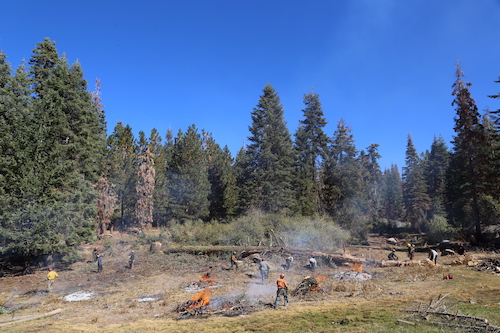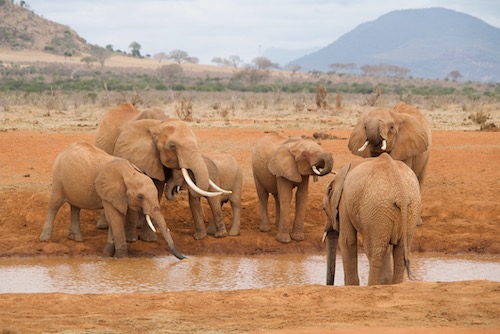Communiqué
CHANGING PLANET revisits six of our planet’s most vulnerable ecosystems and truly inspiring people – Wednesday, April 19 at 9 pm
< < Back toCHANGING PLANET Returns to Monitor Changes in Some of Earth’s Most Vulnerable Ecosystems
Second Season of Seven-Year Project Premieres Wednesday, April 19, 2023 on PBS and PBS.org
Global Conservation Scientist Dr. M. Sanjayan Explores How Communities From Australia to the Arctic Are Confronting Climate Change and Creating Innovative Solutions
CHANGING PLANET returns for a second year to revisit some of our planet’s most vulnerable ecosystems and provide updates on how communities are working to develop resilience in the face of climate change. Two new hosts, Ella Al-Shamahi, a paleoanthropologist and stand-up comic, and Ade Adepitan, a television presenter, Paralympian and children’s author, join global conservation scientist and CEO of Conservation International Dr. M. Sanjayan to uncover this year’s stories.
The series travels from Brazil to California, Greenland to the Maldives, Kenya to Cambodia to chart how inspiring individuals and communities are making progress — and facing setbacks — over the last 12 months. CHANGING PLANET premieres Wednesday, April 19, 9:00-11:00 p.m. ET on PBS, PBS.org and the PBS App.

Over the last year, much has happened to report, from the devastating effects of drought in Kenya to the Maldives, where new scientific discoveries offer hope for the world’s coral reefs. “We have an opportunity to do things properly,” said Sanjayan. “We have the inherited wisdom, we have the science, and we have the tech to understand when things are going wrong and why. Now we need the money and political muscle to implement what needs doing.”
In Hour 1, Sanjayan hosts from Australia, a country on the frontline of climate change, both in terms of its devastating effects but also possible solutions. He travels to the remote Gibson Desert, where the land is under the stewardship of the Indigenous Pintupi, who are having spectacular success preserving a vast and vital ecosystem. Sanjayan learns about cultural burning and how small managed fires guard against megafires and invigorate the landscape with new plant growth. He discovers that invasive species — like the camel — threaten native species, but efforts are being made to control and eradicate their population.
Megafires are also a problem in Northern California and CHANGING PLANET reports on cultural burning, practiced by the Tule, Mono and Yurok tribes. Other efforts to create a fire-resistant landscape include reintroducing the beaver, a native keystone species. The beaver’s natural damming activities restore creeks and rivers and function like speedbumps for forest fires, changing how fire moves through the landscape.
In Kenya and the Pantanal in Brazil, climate change exacerbates human and animal conflict over resources. Host Ade Adepitan explores how scientists are working with Kenyan farmers to develop practical, affordable solutions to keep elephants away from farmland, including a solar-powered box that emits the sound of angry buzzing bees. In Brazil, ranchers, who consider jaguars a nuisance, are coming to understand that their presence increases eco-tourism, a boost for the economy. Scientists are placing GPS collars on jaguars to track their location and avoid human-animal conflict.

Hour 2 catches up with game-changing scientists fighting to protect vulnerable ecosystems. In Australia, Sanjayan explores the potential of “blue carbon,” the carbon captured and stored by the world’s oceans and coastal ecosystems. In Cairns, Traditional Owners work with airport officials to maintain the surrounding carbon-rich mangrove forests. Sanjayan is thrilled to encounter dugongs, the elusive marine mammal whose digestive system distributes and helps germinate seeds from seagrass, an important blue carbon plant.
In Cambodia, host Ella Al-Shamahi examines the heroic efforts being made to support the nearly extinct Siamese crocodile. Scientists are working with Indigenous communities — who consider the crocodile sacred — to raise and release them back into the wild. Scientists are also using technology to track the devastating effects of sand mining on the country’s largest river system, hoping to use the evidence to pressure the government to act more responsibly. In Greenland, researchers track musk oxen, shaggy survivors of the Ice Age, to learn more about how they are being affected by climate change. Musk oxen play an essential role in maintaining the health of the tundra, transporting nutrients uphill and creating more vigorous plants through grazing. And in the Maldives, acoustic experts and ecologists use hydrophones to listen to the heartbeat of a coral reef, leading to the discovery that larval coral responds to specific sound frequencies, actually moving towards the sounds of a healthy reef.
“There are lots of answers that are rooted in Indigenous wisdom and answers that are rooted in modern, cutting-edge science,” said Sanjayan. “Put the two together and maybe there’s a path forward.”
CHANGING PLANET will stream simultaneously with broadcast and be available on all station-branded PBS platforms, including PBS.org and the PBS App, available on iOS, Android, Roku, Apple TV, Amazon Fire TV, Android TV, Samsung Smart TV, Chromecast and VIZIO.

